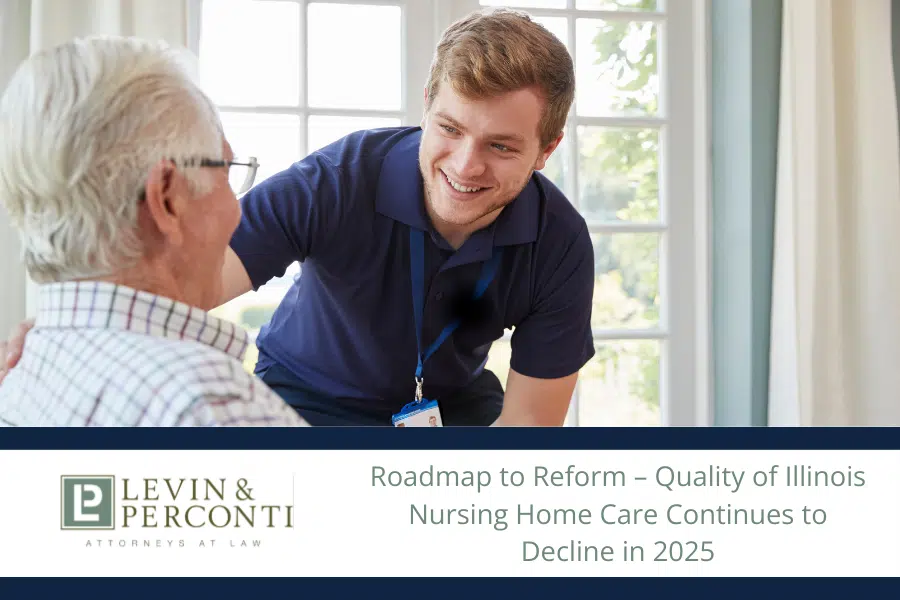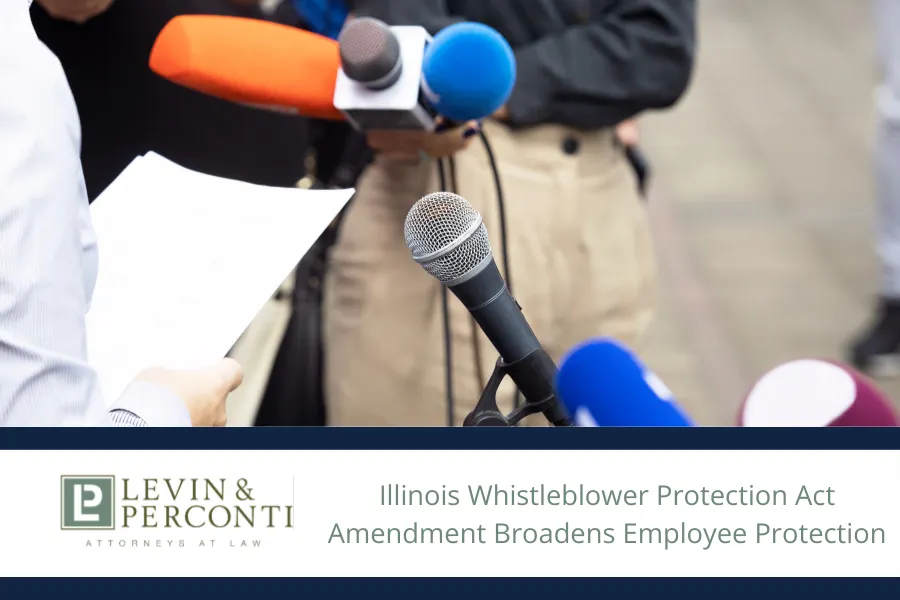
Content Reviewed by:
Steven M Levin
Content Reviewed by: Steven M Levin
Accordion Content
Since 1976, Steve Levin has been dedicated to helping people injured by others’ negligence. He is one of the first attorneys in the U.S. to prosecute nursing homes for abuse and negligence. He’s also helped write new legislation that governs the operation of nursing homes, including the Illinois Nursing Home Care Act. Moreover, Levin & Perconti has obtained the top three jury verdicts in nursing home negligence cases in Illinois.
Long-term care ombudsmen serve as advocates for residents in nursing homes, assisted living facilities, and other long-term care settings. They play a crucial role in identifying and preventing abuse through resident monitoring, complaint investigations, educational outreach, and policy influence. The Long-Term Care Ombudsmen Program plays a vital role in giving nursing home residents a voice and helping families uncover abuse and neglect.
As pioneers in nursing home litigation, we regularly collaborate with local ombudsmen in individual cases and in our ongoing legislative efforts to improve nursing home safety for vulnerable residents. If you’re concerned about a loved one in a long-term care facility, our nursing home abuse attorneys can help. Call Levin & Perconti at (312) 332-2872.
What Is the Long-Term Care Ombudsman Program?
Ombudsmen help ensure that residents are treated with dignity and respect. Under the Older Americans Act, each state must maintain a long-term care ombudsman program to support that mission. The program is a federally mandated advocacy program for residents of long-term care facilities, such as nursing homes, assisted living facilities, and board and care homes. Its purpose is to:
- Monitor residents to ensure they receive quality care and dignified treatment.
- Investigate and resolve complaints on behalf of residents.
- Educate and empower residents to advocate for themselves.
- Advocate for change within nursing homes and in state and federal laws.
A Long-Term Care Ombudsman must put the resident’s wishes and needs above all else and maintain confidentiality. They provide a safety net where residents can speak freely without fear of the nursing home knowing and retaliating.
How the Program Helps Nursing Home Residents
The long-term care ombudsman can monitor a resident’s care and treatment upon request by the resident or other interested person. When a family is unable to visit regularly, the ombudsman may be the only person besides facility staff who sees them regularly. This adds a layer of accountability for the facility to provide quality care. If the ombudsman discovers abuse or neglect, they can report it to the appropriate authorities or help the family report it. However, they can only report abuse or discuss it with loved ones if the resident consents.
In 2022, Long-Term Care Ombudsmen investigated 198,502 complaints and provided information to 407,817 people. According to the Administration on Aging’s most recent data, the ombudsmen network has 4,049 volunteers and 1,835 paid staff.
The ombudsmen program is an invaluable resource for detecting nursing home abuse and improving a resident’s care quality, but an ombudsman’s powers and responsibilities have some limitations because they are not legal professionals.
Ombudsman Program vs. Legal Action
Ombudsmen and attorneys play different but complementary roles in protecting long-term care residents. Ombudsmen can offer emotional support, education, referrals, and monitoring. They can inform you and your loved one about resident rights and nursing home responsibilities, but they cannot do any of the following:
- Give legal advice
- File a claim or lawsuit
- Represent you or your loved one in court
- Negotiate a settlement
Ombudsmen have a unique role in identifying nursing home abuse and neglect. They can meet with residents, view their medical records with their consent, and evaluate the overall condition of the facility. If the ombudsman finds evidence of abuse and neglect, you may have grounds to file a legal case. In such a case, an ombudsman may be able to report it, but you will need an attorney to provide legal advice and file a claim.
Ombudsmen can continue to play an important role after your attorney is involved. They can continue to visit your loved one to monitor their care. They can also assist with the process of transferring to a new facility. If your loved one or their legal representative consents, the ombudsman could also discuss the evidence with your attorney or testify in court.
How to Contact a Long-Term Care Ombudsman in Your State
Every state must have a long-term care ombudsman program, but each state administers its program differently. Some states offer statewide 24-hour CRISIS Lines. Many require long-term care facilities to post the local ombudsman’s contact information in a conspicuous area. The National Consumer Voice provides the contact information for local ombudsmen in all 50 states. In Illinois, the Department of Aging also provides contact information for the long-term care ombudsman.
If you suspect nursing home abuse, contacting the ombudsman is an important step. However, you may also have legal options that only an attorney can handle. Contact an attorney as soon as possible because every state has deadlines for filing legal claims.
Knowing the ombudsman can physically be there with your loved one can provide peace of mind, but an attorney can help you hold the nursing home accountable and recover compensation for the harm caused by abuse and neglect.
Why Families Trust Levin & Perconti with Nursing Home Cases
We have over 30 years of experience handling nursing home abuse claims, and our knowledge of nursing home laws is unmatched. As one of the first law firms in the nation to stand up to nursing homes, we have developed the most effective and aggressive approach for each case. Our attorneys have recovered over $2 billion for our clients, including the following nursing home abuse case results:
- $2.7 million jury verdict for the estate of a 67-year-old man who died from complications of a fall at a nursing home
- $2.9 million record nursing home jury verdict for the family of a 57-year-old resident who suffocated due to negligent tracheostomy care
- $2.3 million settlement for the family of an 88-year-old assisted living facility resident who died from infected bed sores
Our firm is aligned with the goals of the Long-Term Care Ombudsman program. We have testified before Congress and worked alongside legislators to protect the rights and welfare of nursing home residents. We handle cases nationwide from our Chicago office with attorneys fluent in English, Spanish, and Romanian. If your loved one is suffering maltreatment in a long-term care facility, contact us immediately for a free consultation.
How to Join the Illinois Long-Term Care Ombudsman
The Long-Term Care Ombudsman program hires paid and volunteer ombudsmen to advocate for vulnerable adults in long-term care facilities. To volunteer, contact your nearest ombudsman office. You may be eligible to volunteer if you are at least 18 years old, have transportation, and genuinely care for people in long-term facilities. You must complete the Initial Certification Training Curriculum for Long-Term Care Ombudsman Programs. Depending on where you live, you may be required to commit to serve for a minimum period or work for a minimum number of hours.
To become a paid Ombudsman, you must go through an application process. You can check with your nearest Ombudsman program for opportunities or visit the National Consumers’ Voice’s Job Opportunities page to apply.
Frequently Asked Questions About the Long-Term Care Ombudsman Program
These FAQ are provided by the National Long-Term Care Ombudsman Resource Center.
Who Does the Ombudsman Program Represent?
The Ombudsman program’s mandate is to represent the resident and assist at their direction. The Older Americans Act (OAA) requires the Ombudsman program to have resident consent before investigating a complaint or referring a complaint to another agency. In addition, when someone other than the resident files a complaint, the ombudsman must determine, to the extent possible, what the resident wants.
What Happens After I Bring a Concern to the Ombudsman Program?
Suppose someone other than a resident contacts the Ombudsman program with a complaint. In that case, the ombudsman will visit the resident to see if the resident has similar concerns and wants to pursue the complaint. The ombudsman will explain the role of the program, the complaint investigation process, share information about residents’ rights, ask about the resident’s quality of life and care, and seek to understand the resident’s capacity to make decisions. As a result, many residents, even residents with dementia, can express their wishes.
If the resident wants the ombudsman to act on the problem, the ombudsman will investigate the complaint and continue communicating with the resident throughout the investigation process. If the resident cannot provide consent, the ombudsman will work with the resident representative or follow program policies and procedures if the resident does not have a representative.
What Types of Complaints Does the Ombudsman Program Investigate?
Ombudspersons handle a variety of complaints about the quality of life and care. Not all complaints are about the care provided by a facility, and some complaints are about outside agencies, services, or individuals (e.g., Medicaid or Medicare benefits). They can also receive and respond to complaints from individuals other than the resident (e.g., family member) but still need resident permission to investigate or share information.
Do Ombudspersons Investigate Complaints Involving Allegations of Abuse, Neglect, And Exploitation?
Yes. The Ombudsman program investigates and resolves complaints that “relate to action, inaction or decisions that may adversely affect the health, safety, welfare, or rights of the residents,” and that includes complaints about abuse, neglect, and exploitation.
Ombudsmen are directed by resident goals for complaint resolution and limited by federal disclosure requirements. Therefore, the Ombudsman program’s role in investigating abuse allegations is unique and differs from other entities such as adult protective services and state licensing and certification agencies.
Ombudsman programs attempt to resolve complaints to the residents’ satisfaction (including those regarding abuse) and do not gather evidence to substantiate that abuse occurred or determine if a law or regulation was violated to enforce a penalty.
If necessary, with resident consent or permission of the State Ombudsman, if the resident can’t consent and does not have a legal representative, the ombudsman will disclose resident-identifying information to the appropriate agency or agencies for regulatory oversight; protective services; access to administrative, legal, or other remedies; or law enforcement action about the alleged abuse, neglect or exploitation.
Is The Ombudsman Program Required To Report Allegations of Abuse?
There are strict federal requirements regarding disclosure of Ombudsman program information. For example, resident-identifying information cannot be disclosed without resident consent, the consent of the resident representative, or court order. Therefore, these disclosure requirements prohibit Ombudsman programs from being mandatory reporters of suspected abuse.
How Do I Find More Information About the Ombudsman Program and Contact an Ombudsman?
Visit the National Long-Term Care Ombudsman Resource Center (NORC) website (www.ltcombudsman.org) to learn more about the program. Locate an Ombudsman program by clicking “Visit Our Map.”



